A few months ago, as I was running a deposit to the bank, I ran into the store’s landlord at the terminal next to mine. As we both waited on our tellers to process our various requests, we had a small chat. He asked how the business was going. I replied that the store had been going quite well, exceeding our expectations.
“Basically, things are great and terrifying,” I told him, only half joking.
Our landlord shrugged.
“Honestly, that doesn’t go away,” he said, “And the moment it does? Close up, because it means you don’t care anymore.”
This remains the best advice I have received in regards to running a small business.
Ownership: never stop screaming.
It’s been a while since my last retail column, and admittedly, most of that time has been spent wringing joy from the terror. Don’t get me wrong: I am having the time of my life running the store – the only problem has been finding ways to cope with my ridiculous brain. Whenever I think I have things all sorted, a little kernel of doubt will lodge itself inside my brain meats and start dismantling any form of comfort I’ve managed to find. Customer base on the rise? What happens if that stops? Great month of sales? What if this is the best you’ll do? Great idea for a column? Shut up, you’re garbage, and nobody cares. It’s like the internet lives inside my brain. Anyway, as a result of this, it’s become hard to write. I’ve been listening to a lot of slower living podcasts with the wife on our commute to work and have come to realize that a lot of this has to do with the fact that I’ve only had one day off since (at least) April. Turns out, the brain requires time to rest and reset or else it will fill to the brim with crazy and churn until stress and sadness falls out. You live and learn, yes? Anyway, with the store going as well as it has, this situation will soon be remedied – but in the meantime, I figured I’d come back with a topic that’s almost a layup for the purposes of greasing the crazy wheels.
Let’s talk about the DC You.
A bit of background info before we get to the nutmeat: the DC You is an initiative from DC Comics that saw a fair amount of shift in what the company had been publishing in terms of their superhero output. It began with a huge push in June after the company spent two months running Convergence – a series with the unenviable task of keeping people’s attention while the company moved across the country. The idea was, everyone could have their cake and eat it too: retailers and readers would get a big, juicy two month long event ran by a separate editorial and creative pool and the company’s regular players would get a chance to breathe instead of trying to match regular output levels while people either moved, or found their footing as new hires for those who stayed behind. In practice, this didn’t go exactly to plan.
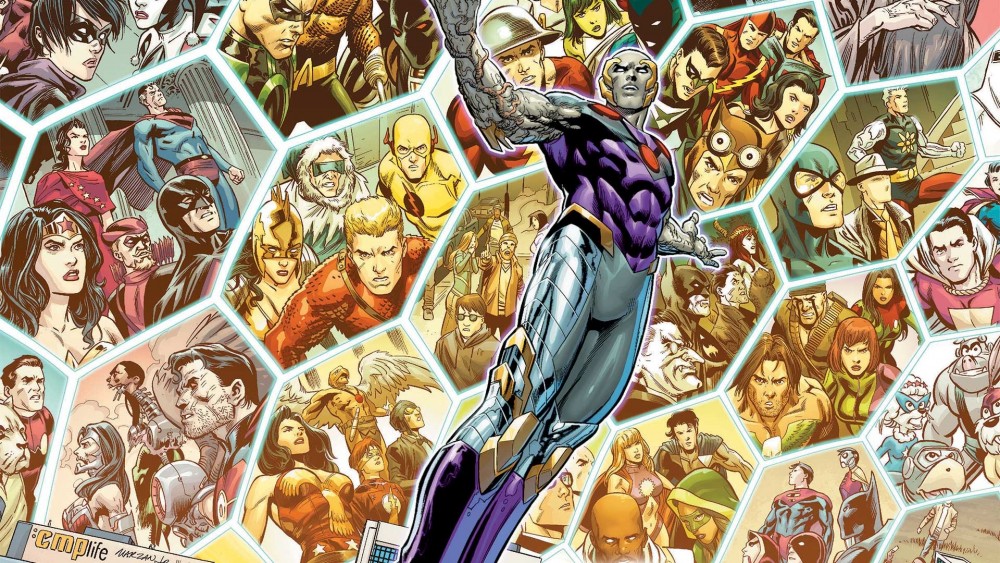
Convergence was a bit of a flop. In some ways, it was almost inevitable. With heavy hitters sitting on the bench, and creative clout being (rightfully) spent on June’s big DC You push, the stop-gap series had a lot going against it right from the start. That said, there was definitely a way DC could have taken their limitations, and turned them into positives. In terms of story, they already had a decent structure: for years, Brainiac has been doming off chunks of reality, and has been keeping them in a collection. Through whatever means (I read the whole series, and this part remains fairly unclear) he ends up losing control of this collection, and a new player decides to fight the realities against each other. That concept is solid: realities fighting realities. Toss in the inevitable realization that they should be working together to take down the real threat, and you have yourself an easy 1 + 2 = 3 structure. From there, you can build whatever structure you please. As long as the main story remains easy to follow, and the tie-ins function on a fairly self-contained level, you can successfully entertain for the span of two months, without doing too much damage to a customer’s buying habits. This was not what happened.
The main story to Convergence was needlessly complicated and poorly structured. They took the idea of realities fighting each other, and ran that through for the majority of the main weekly series, before discarding the entire premise in the final two issues. Seriously, without any real legwork done, one of the main antagonists has a crisis of conscience, and decides to stop the fighting, completely negating the reason for almost every single tie-in series. This, in turn, set up the intended resolution for this series: the negation of Crisis on Infinite Earths, which is something that is done in the span of four pages or so. The result? The DC multiverse is once again infinite, allowing for any kind of story to happen (which is a great fertile landscape), but at the cost of a four page shoulder brush for one of the company’s “most important” stories, and two months of largely pointless storytelling. If this was always what DC had intended (and maybe not something they decided to run with when most of the story was already drawn and written – a very clear possibility), the event should have been structured entirely differently. The battle stuff should have been relegated to three issues of the main series tops, with the bulk of the series about going back in time to prevent Crisis from reaching its previous resolution.
With this different structure in place, some of the tie-ins still could have been about the battle between realities, but more of it could have done stories like Greg Rucka and Cully Hamner’s Question tie-in, which used the loose framework to just straight-up tell a story about the pre-New 52 version of the question with a light bit of event flavouring. More to the point, there should have been a wider range for these tie-in books. Again, speaking to the limitations in the event’s structure both within the realm of fiction and without, these books could have been an excuse to do anything. Instead, they were by and large replays of old ideas from older creators – always looking backwards without looking ahead. Sure, revisit a few old concepts. Attach creative teams that are synonymous with a certain character from a certain era – something like that is always going to sell, even if it’s powered by nostalgia alone. But dammit, why not dig through the ranks of the new up-and-coming talent pool and get them to tell amazing and strange stories. Or hey, why not use it as an excuse to let a mind like Paul Pope or Los Bros Hernandez run wild on a corner of the universe, just because you can? So much wasted potential.
Anyway, where was I? Oh yes. Convergence landed with a wet thud, and retailers are still feeling the effects of this. While the numbers certainly look healthy in terms of overall sales, the story largely failed to connect with readers. What’s more: DC had sweetened the Convergence pot with tasty treats such as full returnability for hitting certain thresholds on books. On the one hand, this made the prospect of ordering deep on the event much more palatable. On the downside, it has created a situation where there’s a glut of this product out on the shelves. Compound this by the fact that initial orders for the entire event (including the weekly nine-part main title) were all due before the first Convergence related title hit the shelves. Now compound that with the fact that these titles didn’t start being returnable until after initial orders for June’s big DC You relaunch, and you have a very bad retail situation – which inevitably resulted in a poor environment to launch a new line of books with.
With a bunch of unsold copies of Convergence titles choking out shelf space, retailers set about manifesting some numbers for the new DC You books. Very recent experience had shown the company pushing the Convergence line (a full month of number one issues) with about the same amount of arm waving and excitement as they were with the DC You titles. Consciously or unconsciously, a look around the store would remind a retailer exactly what buying into the previous hype had done, and that message wasn’t great. From that point, there was also the fact that Marvel was in the midst of marketing the hell out of their Secret War line-up, and doing so by attaching more incentives to their books than DC were doing with their own. This, was essentially a battle of perceived confidence. Here was DC tossing the odd 1-for-25 variant on their books, while offering small pools of retainability and discount incentives for hitting certain thresholds, and there was Marvel, offering reams of different variant covers set at different qualification levels, with rolling announcements that spread the risk over a few months and the promise of higher discounts at certain levels. Sprinkle on top of that Marvel’s recent market dominance and their near pitch-perfect execution of the Secret Wars event structure, and you have a more enticing product line facing an unproven initiative.
Beyond that, the DC You was pushing the company outside of its very narrow comfort zone in a big way for the first time in a long time, and there was no real marketing structure to support the change. For years, the company trained their readers to expect a certain style of story – and so a very specific audience built around those books. Tossing in a bunch of different flavours because Mark Doyle was (and is) killing it in terms of making the Bat-line of comics hum with books like Gotham Academy and Batgirl doesn’t automatically mean those books will suddenly sell. Yes, the audience for those different books exist, but they have to be made aware – and honestly, the reason why Gotham Academy and Batgirl worked had absolutely nothing to do with DC’s marketing, and everything to do with the creative teams of those books hitting the pavement, and making people aware of what was coming, and encouraging that audience to engage, even before the books were released – and when the industry lives or dies on how many titles are pre-ordered by retailers, getting that interest in place before the series hits is extremely important for the success of your books, or your line.
So yes, the current state of DC looks a little worse for wear. They just moved across the country, and lost a lot of people in the process, including Bob Wayne, who as a former retailer, understood how retailers thought and would eventually place orders. The company was hobbled by an almost necessary stop-gap event that sadly didn’t come together – and then they made the mistake of marketing the new line using very similar language and incentives from a freshly remembered botch. This does not, however, reflect the current state of quality for the current line of books – only to how those books entered the market on unsure footing. Personally, I think DC has one of the best line-ups they’ve had for years. It has a broader slate of creators than before and while a good chunk of the line is same-old-same-old, so much of it feels new and vibrant.
To really focus in on this point, I want to talk about Prez. Right now, I believe that Prez is one of the best books in the comic book industry today. It’s a razor sharp series with amazing writing and art, and there was a three page sequence in issue two that rocketed from slapstick humour, to rage, to helplessness, to beauty, to sadness and never once felt jarring. Mark Russell and Ben Caldwell consistently surprise me with their level of craft and ability – and for me, that’s something that’s hard to come by given the volume of comics that I consume for work purposes. It is also one of DC’s lowest selling titles. Why? Well, the concept doesn’t necessarily mesh with the audience DC cultivated over the past few years, and the language DC used to promote it was flawed from the start.
Right off the top, it was a different series awash in a sea of proven concepts, asking for money. A smarter plan would have been to launch this (and the other new concept books) during month two, where it’s not competing for dollars against Batman or Justice League pushes. Strike two? Calling it a twelve issue mini series. Want to know a sure way to make a retailer hedge their bets? Toss an unproven concept up as a mini-series. Even if a book is only intended to go 4-12 issues, it’s always better for a company to take a book like Prez and just run it without slapping an “of X” to the end of it. Retailers equate ongoing status with company confidence. They see an open ended run, and say this company wants this to go as long as it can sustain itself rather than this company thinks the concept will run out of juice at this point. And strike three? Dropping the phrase “this series is now a six-issue mini-series” into the issue four solicitations without further explanation. If you hit the internet, you’ll see that the company line says that Prez will now be two separate six issue mini-series – but for those retailers who didn’t seek out this information (a high percentage, I would assume, due to the already low retailer interest in the book), it appears as though DC has even less confidence in the book, cutting its run even shorter than previously announced. This last bit could have been avoided if they had just said “this series will now be two six-issue mini-series” – which would actually be shown as a vote of confidence. Not only would it show that the company is dedicated to seeing the title through to its natural conclusion, but doing so with the promise of a new number one and the implication that they want to series to release as solicited with the same creative team, rather than be met with delays on the back end. This shows that a company cares – and puts that information directly in the line of sight for the people who are actually ordering the book, and providing DC with numbers.
Now that the company is attempting to push outwards from its formerly narrow viewpoint, it is essential that they learn how to market accordingly. Having lost a good source of implied retail vocabulary in Bob Wayne, they are attempting to do without any style or verve. What retailers need to see – especially in terms of their line outside of their mainstay superheroes like Batman and Wonder Woman (and hell, sometimes even Wonder Woman) – is a projection of confidence from the company, whether that’s implied by the incentive structure, or by the language they use to solicit the books, and a perceived interest from their readership, which can be done by mobilizing social media buzz and doing sustained pushes during final order cut-off weeks. Some companies are particularly good at providing previews of their upcoming books during the FOC period, alongside promotion from the creative team and editorial. DC doesn’t quite have a handle on that, as evidenced by the haphazard way they scheduled the 8 page previews of all of their DC You titles in May. Very few of those (if any) lined up with the book’s actual final order cut off date, so retailers weren’t hearing whispers of excitement right before they adjusted their numbers. What’s more to the point, all of these previews were consistently released in a chunk, instead of staggered out over a several hours and days – which would have provided the company with sustained and building noise across a longer period of time, instead of a jumble of noise created all at once.
I want DC to do well. If they are selling more books, and reaching new audiences, then I clearly benefit from that. What they need is to get their marketing under control. Grow from this experience. Maybe hire a consultant or two who speak the language to bring your outside-the-comic-industry marketing hires up to speed. If you start controlling the message (like Marvel has very successfully done – just take a look at that market share), you’ll start selling more books.
A COUPLE OTHER THINGS.
- This is already far too long – and I’m roughly 100% sure someone is going to hit the comments without reading this bit, but whatever. Here it is: I do realize that the comics market is larger than the direct market, and that the numbers DC displayed for their June launches might not be an accurate reflection of where they are as a company. I think this article does a far better job of explaining where DC is succeeding outside of my narrow purview far better than I ever could, so definitely read that. But the fact remains: if they are doing very well outside the direct market, the message they put out there needs to say that. DC tends to play defensive instead of offensive, and as a result, they aren’t scoring very many points. Instead of combating rumours of regressing the line to its previous state with unsupported claims at a long game, grab those social media statistics! Tout your positive moves! And dammit, don’t just block shots when being fired upon – get out there and make positive noise! Stop reacting, and be proactive. The company will be far healthier for it.
- Clearly, there’s a lot more to this than what I’ve covered here – and the next Retailer’s View article is going to be about the dangers of retailer incentives as part of your company’s plan to show confidence in your product. With any luck, that’ll be up in a week as I start going through the order book for November and start convulsing involuntarily once I hit Marvel’s wall of incentives. Look forward to that, if I’m not a heap by then.
[Brandon Schatz is an owner of Variant Edition in Edmonton, Alberta and has spent the past nine years working behind the comic book counter. In his spare time, he writes about the comics and culture. You can find him on twitter @soupytoasterson and at his website, Submetropolitan. The opinions expressed are those of Schatz and do not necessarily reflect those of The Beat.]


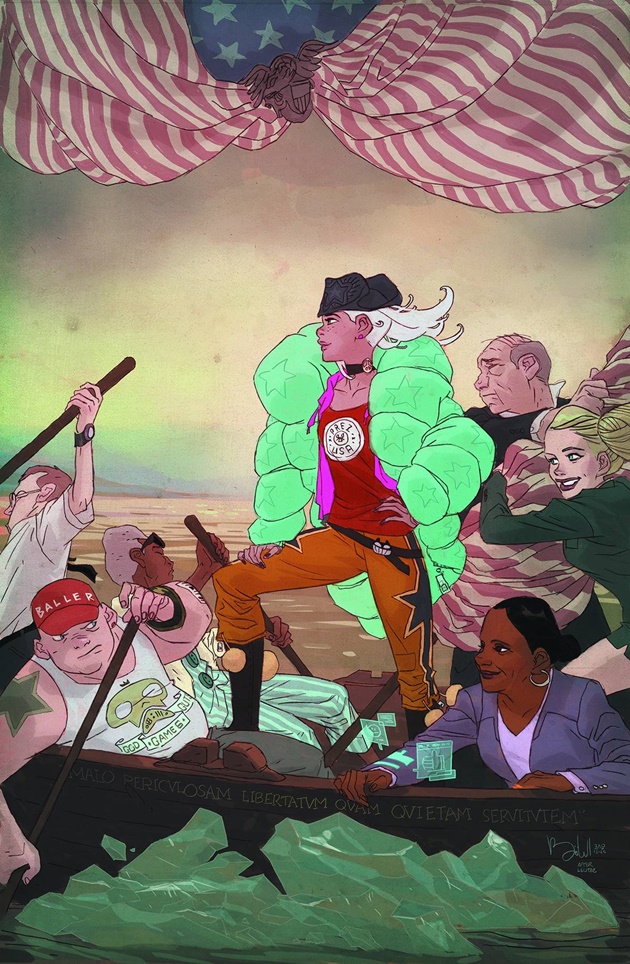

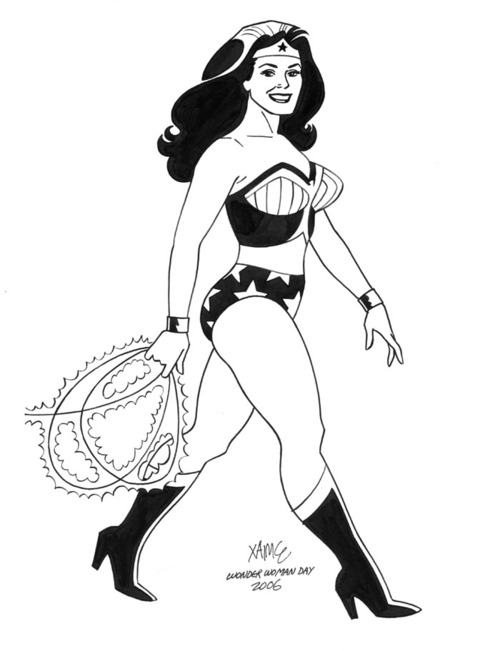

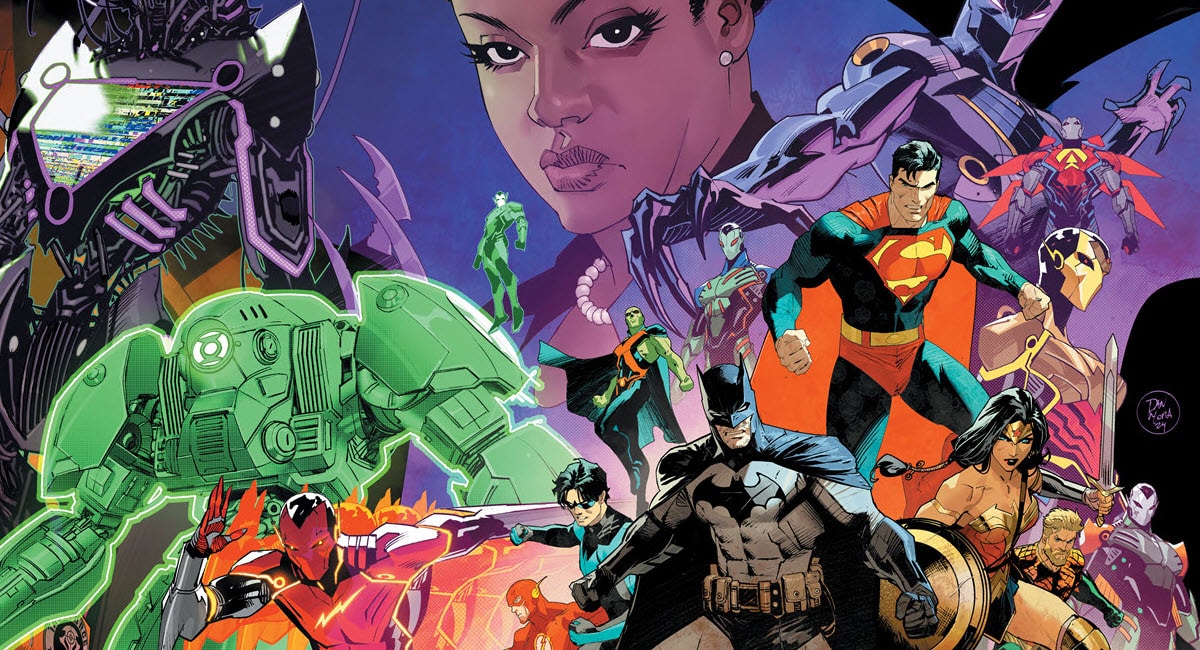
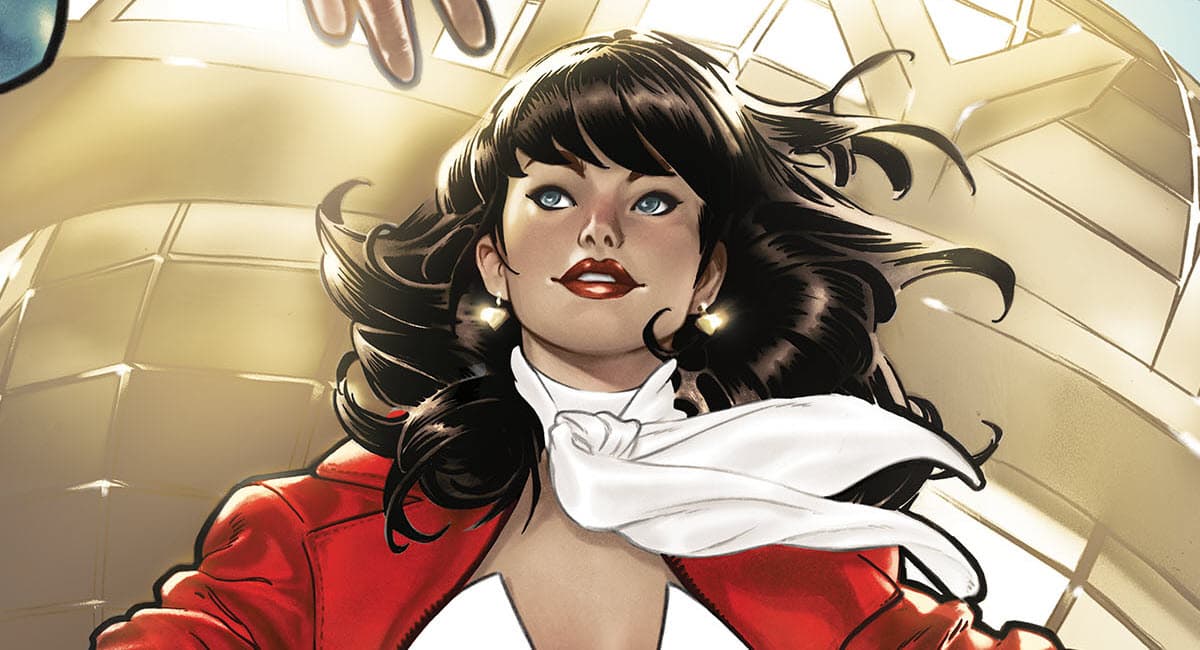
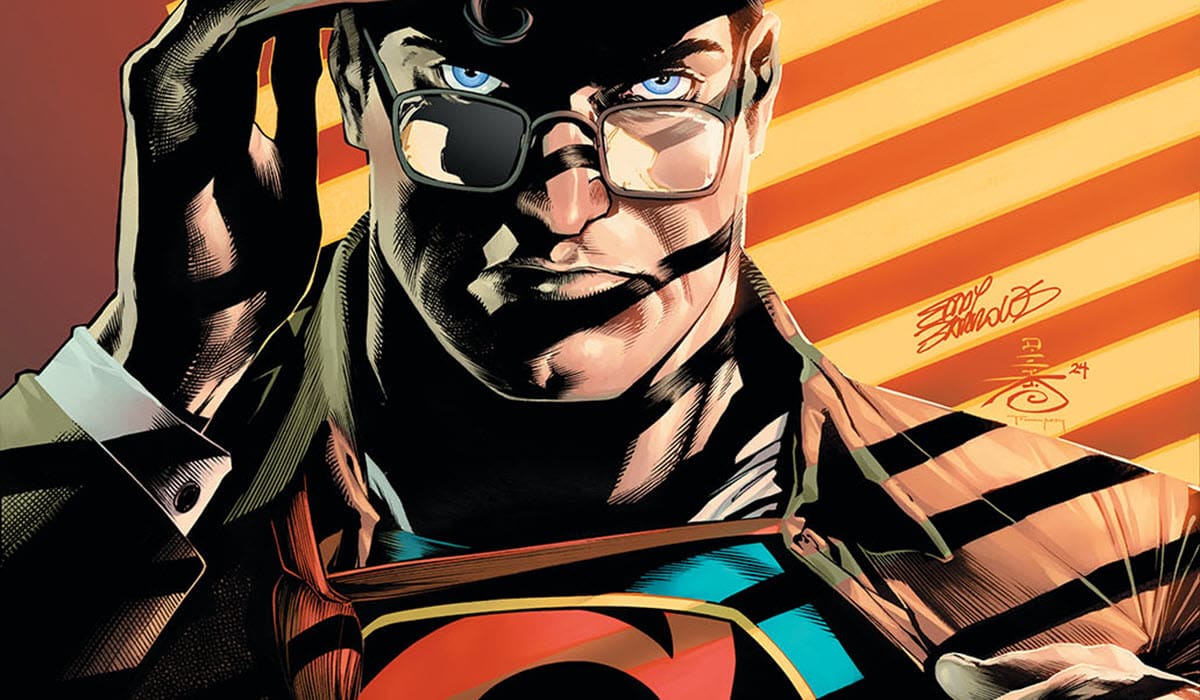



In regard to Prez – you should read the comments on the Beat’s July DC sales analysis.
To quote myself:
“@Brian (and other guy!) – can i say a point about Prez? two points.
1) the preview to Prez in whatever Convergence book that was, – was very strong. The character was President, it had action, and she had agency. She was making decisions and being awesome.
2) IN the first issue of Prez (which I bought) – she had no agency. Not only was she not President, but she wasn’t taking steps to become president. Her Presidency isn’t a result of actions on her part, but of an accident with a fryer, and things being done TO her (dude uploads to youtube against her wishes, a different dude supports her for no reason) – She was NOT A PROTAGONIST.
Hibbs is right, that’s crap writing and crap editing. That’s why I didn’t come back for Issue 2.
Do you really really like Prez? – Buy 3 copies. It’s the only hope.”
to Quote Brian Hibbs:
“I find it pretty weird you’re using a DC comic to try to make a point about indy sales, BUT…. PREZ #1 featured 20 pages of story where the LEAD CHARACTER DID NOT MEET THE STATED PREMISE OF THE COMIC — she, in fact, doesn’t even come CLOSE to becoming President until issue #2. That, right there, is the sign of a writer (and much much more… an EDITOR!) who doesn’t know what he’s doing, and that’s why in my Indy-friendly store where we stumped hard for the book sales between issue #1 and #2 dropped by 60% or so. That’s like if BATMAN #1 ended with Bruce and his parents looking at the paper and talking about maybe seeing a movie over the weekend!”
Seriously. Prez is not a good book. It’s not a good book specifically because it does not do what it says on the tin. If you’re enjoying it – buy 3 copies.
https://www.comicsbeat.com/dc-comics-month-to-month-sales-july-2015-life-the-universe-and-everything/
To @AwesomeDude – First, thanks for your opinion of the book – I can definitely see how Prez #1 could read like that, and see how folks would be frustrated by the lead character not being president by the end of the first issue. I read the preview and first issue differently, with the preview showing intent, and the person Beth Ross would become. I also like how the first two issues are about her choosing what’s important to her, and shows her resolve in the face of what appears to be crushing and inevitable, which in turn informs her decisions and resolve once the plot moves her into position. In terms of becoming president, she is passive. In terms of being president, she is not.
But that said, that’s my reading. That’s the fun of comics, and entertainment in general. Prez is not a good comic for you. Or I guess for Brian Hibbs. And that’s fine. As a reader, it’s your right to enjoy the books you read and it’s frustrating when you don’t – especially if you wanted to like something. As a retailer, I don’t have that luxury. Given my personal tastes, there’s a few comics I wouldn’t be ordering. As a result, I don’t have those books in my personal collection. But as a retailer, it is my job to sell books to people who will connect with them, regardless of my opinion of them – and that’s what I do.
Currently, Prez is my second best selling DC book, next to Batman – which is saying something, because Batman is a dynamo. I’ve had to place re-orders for every issue at this point, and honestly, I probably lost a customer or two from not having an issue here or there at any given point in time. Obviously, my sales don’t reflect the larger market, or even what Hibbs is experiencing – but to that end, Hibbs’ experience don’t reflect the larger market either. He’d probably be the first to admit that his sales charts don’t look exactly like the top 300.
But anyway. I’m gonna keep selling the hell out of a book that my customers seem to enjoy quite a bit, and I’m going to allow my orders reflect that. And I’m also going to go ahead and not read comments sections (beyond, you know, the two days or so I check back on the articles I write) because fun fact: comment sections and opinions sure as heck do not accurately represent anything beyond singular opinion. So I dunno. Keep doing you, I guess, and I’ll continue to purchase far more than 3 copies of Prez because… well, I have a store to run and 3 isn’t even going to BEGIN covering what I need for files.
Sorry. I should make it clear.
The fact that myself, and Brian didn’t personally like Prez isn’t really the key point. The point is, from a neutral stand point, it’s extremely obvious why the book sold so poorly. The lead character does not have agency and the book does not do what it says on the tin. That’s bad writing and bad editing.
As for the DC-You. You’re right. Bad marketing, bad concept, bad execution. DC is in a much poorer position without Bob Wayne. I’m not sure what they need to differently, as not every book can be Batgirl, but they have to do something, and soon.
Marvel, smart but evil…DC, just plain dumb.
I should probably have led with this but – i liked your article. Great specific take from a retailer perspective on how the poorness of Convergence affected the ordering of the DC-You push.
For what it’s worth I’m glad Prez is selling well in your store. Comics that sell well keep the industry afloat, and I’m very much in support of keeping the industry going. And it’s especially encouraging when a book that’s selling well is not a super-hero book and is potentially bringing in new readers.
@AwesomeDude – I’m glad you liked the article – I think our break down is this – I suppose that books like Prez (and really, the whole current DC You initiative) isn’t selling well because of the marketing, and how retailers are ordering. I base that from the fact that these numbers are usually a reflection of initial orders with very little adjustment – because HOLY WOW, retailers are slow moving and a good chunk do not do FOC for whatever reason. I know the orders for issue one can ONLY be that – and while I agree that the drop might have been steeper due to content, I wouldn’t put that down to editorial or creative team.
We can both surely find examples to support our theories – it’s certainly easy to do and there’s a lot of specifics that can be pulled. But after working in comics retail for… man, nine years now? I can tell you how little customers care about not getting the whole story in the first issue – or at least in any form of actionable way. Regardless, I’m pretty sure we’re just going to end up agreeing to disagree. Thanks for reading and offering your opinion though! It’s appreciated.
How could Prez sell badly because she’s not president in the first issue? Wouldn’t that take people reading the first issue and then telling their retailers they don’t like it? So, the sales for like issue 4 would drop?
Prez looks awesome. It also looks like the only interesting DC You book. Superman in jeans isn’t really a strong sales hook.
There was a Prez preview? I’m a long-time comic fan very interested in DCYou, and I had no idea. They did a horrible job promoting these “free tastes”. Even when I knew there was one I wanted to see — for Starfire, and I found out there was a preview because I was confused by what was going on with the character and then reading a review column, good job, DC — I had a very hard time finding it online.
I share “AwesomeDude”‘s take on Prez. I tried the first issue, wondered where the President part was, and didn’t come back.
@AwesomeDude
PREZ isn’t a bad book because she wasn’t President by the end of issue one; it isn’t a DC book because she wasn’t President by the end of issue one. Which is kind of what Brandon seems to be talking about: DC was courting an audience with PREZ who probably doesn’t even look at the DC shelves in the store. Meanwhile, audiences whose bread-and-butter was typical New 52 DC stuff would almost certainly find the stylistic choices made here off-putting. That’s not bad, because DC wanted to court a new audience. They just courted very poorly.
It’s silly to pretend like you’re a ‘neutral observer’ just because you didn’t like a book. It’s well-crafted as hell, with phenomenal design and world-building and an emphasis on character instead of plot. It’s just not a DC book.
It seemed like it would’ve been a Vertigo title once upon a time–or at least the way I treat Vertigo books is how I went with Prez. I liked the first issue enough I’ll check out the collected edition(s) from the library when the series is completed…if I remember to. Just too many good books and prices are too high–standards get raised. If everything’s working right even good books don’t make the cut.
DC’s moves over the last 3-5 years have damaged the brand with me. I’m so far out of DC at this point it’s easier to just not bother with their output altogether and cherry-pick this era of DC in retrospect…once the verdict is in on what’s decent.
CJ – a first issue that does not deliver on the premise of the book is a good reason not to come back.
Brian Hibbs is more eloquent, so I”ll quote him again.
“That’s like if BATMAN #1 ended with Bruce and his parents looking at the paper and talking about maybe seeing a movie over the weekend!”
That’s like if the first episode of Lost ended with Jack going to the bathroom in the Airport, and John Lock ordering a sandwhich at the Subway in the terminal.
but regardless – DC did court new readers poorly with the DC-You. True dat.
One of the best analisis i ever read in relation to comic book industry, thanks man!
If I had a dollar for every time since … let’s go with the the period after the death of Superman …. that DC has had some kind of initiative putting out books intended for new (and lapsed) readers, then failed to tell not-current-readers about it, I could be dining out tonight. Press releases to comics web sites, house ads, and posters in comics shops aren’t going to expand the audience.
It sounds like Pez comic is quite cool and I was completely unaware that it existed. I know Pez is supposed to be a DCU character, but perhaps it would have done better as a Vertigo comic. As I think that it would have fit the audience better than in the DCU. It’s unfortunate that DC has done this a couple of times.
Comparing Prez to Batman or Lost is kinda silly. Despite one of those even being an entirely different medium, it’s a story from artists with a particular vision, and you can tell stories in millions of different ways. Prez just happens to be told in a way you don’t like. It’s art, and it’s only ever going to be a matter of opinion, because intent and interpretation is a one-on-one exchange between artist and beholder, no matter how many opinions you hear/read. Unless you’re highly suggestible, I guess.
That said, I’m enjoying Prez so far. (The first two. I don’t get to the store that often.) And this is from someone who previously purchased zero DC titles. More please, DC!
The DC You Previews in the Convergence titles were also available online.
DC flubbed that, although I did see targeted ads for the launch on my Yahoo Mail page.
Was there a free digital sampler featuring ALL of the previews, available on ComiXology or Barnes & Noble? At B&N, it’s the SIXTEEN page print sampler they handed out, which is mostly the full page ads which were run in the comics.
STRIKE ONE
I used to be on the comp list for DC (I guess I was removed during the move and reshuffling). But I read all of the new titles, and enjoyed every one. Most would have gone to the top of the “read first” pile. (The restarted New52…wait and see.)
Yet, where is the publicity? Martian Manhunter has a great premise. Doomed, a good teen book. Starfire, Bat Mite, Bizarro, Black Canary, Prez…
So, better marketing would have worked much better, especially during Con season. Which would have been after the launch of the #1 issues, so DC could have handed out free copies (see: Image booth) without angering retailers.
Also, do NOT tell the retailer or fan the life expectancy of a book. (Unless it’s a finite series.)
Sure, give the talent an initial order, say six issues.
Let the book sell, and if it works, keep printing. If it doesn’t, you sell the trade, and see if there’s some extra interest. Maybe you start it up again. Maybe you place it back in the archives and let someone else play with something else.
Would it be better for DC to launch one title a month? Give it a focus, push it everywhere, make it buzz? I understand the need to relaunch after Convergence, but going forward, instead of the New52 waves (which begin to look embarrassing), keep the news cycle running with a new title each month.
It’s the Levitz ABC Paradigm, used for marketing. Title A is the hot new thing. Last month’s Title A is now B. It gets some buzz, reviews, fan reaction, outreach now that it’s on stands, which helps keep issue #2 from dropping too much. Last month’s title B is now C. Issue #3 maybe features the ubiquitous cameo from, say, Harley Quinn. Or a long forgotten character which might just work via reintroduction, and which generates some more buzz to keep the sales from dipping. It’s the middle of the first story arc, so things should be getting crazy, which drives interest and encourages people to go and buy the back issues!
Just like those classic Legion of Superheroes stories with the silhouetted figure in the last panel, you tease the NEXT Big Thing.
The merits of Prez aside (so very very weird to wake to cut-and-paste walls of texts of your own!), I’m surprised that you’re calling for publishers concealing limited series nature — the mid- and long-term stocking position on a mini versus ongoing are entirely different, as I see it, making “duration” one of the most key datapoints in a solicitation. The point for me, at least, is how long do I need stock for — minis almost never have further demand a week or two after their conclusions.
I do, however, agree with the notion that turning a 12 into a 6 out of the blue makes things even worse. Thing is, while there may be some information about that being “two 6-issue series”, with just 13k ordered at issue #2, it’s hard to see PREZ coming back for that 2nd six?
-B
I honestly thought they did a decent job of marketing. I wasn’t reading DC comics, but saw the advertising for DC You on comics websites and looked at some previews and bought in heavily. I’ve picked up 75% of the DC You books, but unfortunately besides Gene Yangs Superman, the DC You books are all rather mediocre. PREZ and Black Canary are decent, but I was expecting some huge indie wing of DC comics or something from the marketing. Oh well.
@Brian Hibbs – Honestly, I’m not too fussed about knowing a series’ length. Ongoings become retroactive minis all the time and some books never finish. The current cycle of seasonal launches and digital availability has honestly done away with the traditional long term stocking – or at least in any way that I see it benefiting comic shops. I usually order what I think will sell within 6 months of anything, given strength of concept and character, and have taken to taking in books people want rid of, and that usually fills in the majority of any needed back stock, at a lower cost to the business.
@Torsten – I really like that idea of marketing. I know the bigger theme parks do this – one of the big rides is down for a retooling, or a new ride is being worked on in a constant cycle, so when you’re there, you miss something you might want to come back for. I’ve always thought that was a smart idea.
“If I had a dollar for every time since … let’s go with the the period after the death of Superman …. that DC has had some kind of initiative putting out books intended for new (and lapsed) readers, then failed to tell not-current-readers about it, I could be dining out tonight. Press releases to comics web sites, house ads, and posters in comics shops aren’t going to expand the audience.”
the marketing was awful, but i think main problem is that most readers want a definitive direction for DC universe. there is a large public that buys Ms Marvel on comic shops not buying DCYou books.
To make people interested on marginal concepts, DC has to fix superman, wonder woman, earth 2 and their continuity
The marketing was really the downside. For a title like Black Canary, I know people who liked Ms. Marvel (and plenty of people in general who don’t regularly read comics) would love it…but as has been said by others before me, there just wasn’t any marketing to non-traditional comic book fans. Why not have a TV spot during reruns of Arrow or The Flash, both of which are quite popular? I know Venditti and Jensen said they’ve made some changes to The Flash to help connect with fans of the TV series, but how many of those fans even give the comic book series a second thought? Just my two cents.
Comments are closed.